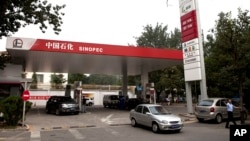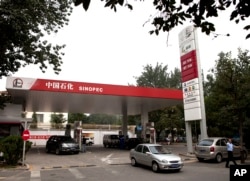As China presses forward with a wide-ranging anti-corruption drive, economists and financial professionals say its impact on the broader economy is already starting to be felt.
They say the climate the anti-corruption crusade is creating is not only sapping productivity, but hurting business.
“There is this worry that people, especially in state-owned enterprises, are just sort of cruising,” said Jeffrey Towson, professor of investment at the Guanghua School of Management of Peking University.
He said this is playing out into a situation where bankers are reluctant to give loans, do projects or sign deals, especially in state-owned sectors that do not face market pressures.
“If you are in a bank, you ask: ‘why should I give loans? I might be attacked for giving an inappropriate loan’. If you do something you might get into trouble. No one ever gets into trouble for not doing anything,” he said.
Sinopec spotlight
Fu Chengyu, the newly-appointed head of Sinopec, China’s biggest energy company, recently told state-run CCTV about how the party’s anti-graft inspectors spent a month probing its operations.
While Fu told CCTV that he welcomed the investigation and would take full responsibility for the company he now heads, the interview highlighted the pressures he is facing.
Talking about the difficulties of uncovering corrupt practices, Fu said, “You know the problem, but you may not know the reasons behind it because we have too many layers of management. A lot of problems have taken place in maybe the third layer or the fourth layer.”
Fu added that while Sinopec may know that problems exist, its management does not necessarily know who may be responsible.
The energy sector led by Sinopec has been in the spotlight since investigators started looking into one of China’s biggest anti-corruption catches, former security chief Zhou Yongkang. Zhou rose to power through the influential oil sector.
Empty chairs
China’s hard-hitting anti-corruption drive is putting more emphasis on rooting out corruption at state-owned enterprises this year. Authorities have said as many as 26 companies from major telecom companies to those in the energy sector will be in party graft inspectors’ crosshairs this year.
The drive has created what some call an “empty chairs” syndrome, where officials are absent or missing from meetings.
Industry sources say officials in government agencies and state owned companies often abstain from meetings with private sector representatives. And that is because they are either under investigation or fear they might come under probe for past wrongs.
Andrew Key, deputy head of mission at the British Embassy in Beijing said the number of delegates who could not attend the recent annual session of the National People’s Congress, the country’s parliament and the Chinese People’s Political Consultative Conference, went up this year as compared to earlier years.
“China is putting supervision of party [cadres] on the same footing as achieving a prosperous society,” Key said.
Key made his remarks about the anti-corruption campaign at a gathering of foreign business executives to discuss the NPC. The conference was hosted by the Guanghua School and the British Chamber of Commerce in China.
He said what is happening is a sign that the anti-graft campaign will continue and there will be not let up.
Debt Doldrums
One important task Chinese Premier Li Keqiang set for the economy in his recent Government Work Report is resolving the problem of China’s massive local debt. China’s local government debt is believed to exceed $322 billion and poses a major challenge to the economy, which continues to slow.
But that effort too, is being challenged by the anti-corruption drive because officials are worried that making decisions could make them vulnerable to future investigations.
“Of course, the government wants to control the explosive growth of local debt. But it is a tricky issue to strike a balance between disciplining local governments and giving them incentives for growth,” said Liu Qiao, a finance professor at the Peking University’s Guanghua School of Management. “Because of the anti-corruption drive, the incentive for local government has been affected,” he added.
Speaking with VOA on the sidelines of the conference, Liu said this year will be critical for China in terms of addressing its local debt situation.
“If everything goes back to normal, and development is still given the top priority, then local government officials will have the incentive to do more,” Liu said.
Liu was suggesting a “normal” situation would be one with less pressure from anti-corruption inspectors and them not breathing down their necks of officials. But few see that happening anytime soon.





